 W
WAll Purpose Cultural Cat Girl Nuku Nuku is a Japanese manga written and illustrated by Yuzo Takada. It was serialized in Weekly Manga Action for only three issues in 1991, with the three published stories later compiled in a single volume collection in December 1997. The story begins when genius inventor Kyusaku Natsume transplants the brain of a cat found by his son Ryunosuke on Christmas Eve, into a schoolgirl android that he created and subsequently stole from his former employer, Mishima Heavy Industries. The result, Nuku Nuku, is a nekomusume or cat girl. The manga was licensed by ADV Manga and published as a single volume on August 24, 2004.
 W
WBowsette or Koopa-hime, is a fan-made, moe anthropomorphized and gender-swapped version of the Mario franchise character Bowser, in which he is transformed to resemble the character Princess Peach using a power-up. The character was created on 19 September 2018, by a Malaysian artist named Ayyk92 as part of a comic strip which he posted online. Bowsette quickly rose in popularity internationally, with related hashtags in English and Japanese trending on Twitter. Bowsette is typically portrayed as a blonde woman with horns, fangs, a spiked collar with matching armbands and a black strapless dress. Several professional Japanese artists contributed their own renditions of the character. A convention themed around Bowsette was planned for October of the same year.
 W
WCat Paradise is a fantasy action manga written and illustrated by Yuji Iwahara. It was serialized in the monthly seinen manga magazine Champion Red from June 2006 to December 2008. Chapters were collected by Akita Shoten in five tankōbon volumes. Cat Paradise is licensed in North America in English by Yen Press, with the first volume released in August 2009.
 W
WDamekko Dōbutsu is a Japanese manga series by Noriko Kuwata serialized in Manga Life since the November 2001 issue. It was later adapted into a comedy anime series on Kids Station, a Japanese broadcast satellite station. It features characters that wear kigurumi costumes. Each character in the anime does not live up to the standards of their species, making them outcasts who must live in the "Useless" Forest. The main character, Uruno, is a wolf who has the personality of a shy rabbit; meanwhile, his friend and foil, Usahara the rabbit, has a wolf-like dominance and aggression. Each of the 26 episodes is 5 minutes long, bringing the total series to 130 minutes.
 W
WDi Gi Charat , also known as Dejiko or Digiko, is the main protagonist of the manga and anime of the same name created by Koge-Donbo. Dejiko is a princess of a planet that is also called Di Gi Charat, she is also depicted as a catgirl which is highlighted by her ending each sentence with the cat sound 'nyo'. Dejiko can be violent at times and will resort to using her special ability, eye-beams, to inflict damage on others. She is close friends with her sidekick Puchiko who has a contrasting personality to that of Dejiko's.
 W
WDi Gi Charat is a Japanese manga and anime series created by Koge-Donbo. The series follows a catgirl named Di Gi Charat "Dejiko" who was adopted as the mascot of Broccoli's retail chain store, Gamers. The original anime series and its original video animations (OVAs) are set in a Gamers store. There are twenty Gamers stores across Japan.
 W
WDog Days is a Japanese anime television series created by Masaki Tsuzuki, also known for his work as creator of Magical Girl Lyrical Nanoha and produced by Seven Arcs and Aniplex under the direction of Keizo Kusakawa. The story revolves around a boy named Shinku Izumi, who is summoned to an alternate world by Princess Millhiore in order to defend Millhiore's country, the Biscotti Republic, from the neighboring kingdom of Galette. The series ran for 13 episodes on Tokyo MX and other channels from April to June 2011. A second series, titled Dog Days', ran for 13 episodes from July to September 2012. A third series, titled Dog Days″, ran for 12 episodes from January to March 2015.
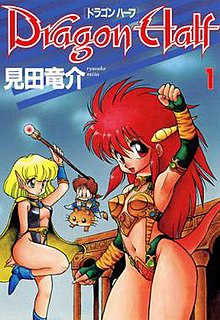 W
WDragon Half is a Japanese manga series written and illustrated by Ryūsuke Mita. The manga was serialized in Fujimi Shobo‘s Dragon Magazine from January 30, 1988 to April 30, 1994 and the chapters collected into 7 tankōbon volumes. It was adapted into a 2-episode OVA series animated by Production I.G in 1993. ADV Films had previously licensed the anime series in North America. Discotek Media has since re-licensed the OVAs for a DVD release in 2014. The manga has been licensed in North America by Seven Seas Entertainment.
 W
WFelicia is a fictional character and the main protagonist in the Darkstalkers series of fighting games by Capcom, where she is an optimistic American catgirl who was raised in a convent. Introduced in the 1994 game Darkstalkers: The Night Warriors and its subsequent sequels, she has also appeared in other games outside of the Darkstalkers series and related media and merchandise, becoming one of the most popular Capcom characters.
 W
WFoxy Lady is a manga created by Ayun Tachibana. It is a mixture of romantic fantasy which also fits into the kemonomimi genre. It is about Kogane Mikasa, a kitsunemimi (fox-girl), who is half-human and half-demon. She enters the human world via a shrine run by her aunt and uncle, and dedicated to her father. When she arrives into the human world, she encounters a trainee priest and heir to the shrine Jin Mikasa. Kogane forms a friendship with Jin after she kisses him. When they kiss, Kogane is able to achieve her ambition of turning into a human, albeit temporarily.
 W
WFran is a fictional character in the Final Fantasy series of video games. She is a member of the Viera race, a group of rabbit-like humanoid people. She appears in Final Fantasy XII, having left her tribe and worked as a copilot to the pirate Balthier. Her character design was created by Akihiko Yoshida. She is voiced by Nicole Fantl in English and by Rika Fukami in Japanese. Her English voice performance took inspiration from Icelandic singer Björk, which left Square Enix skeptical but eventually sated with their explanations. Fran later appears in the Nintendo DS sequel Final Fantasy XII: Revenant Wings.
 W
WFree Collars Kingdom is a Japanese manga series written and illustrated by Fujima Takuya. The individual chapters were serialized in Magazine Z, and compiled into three tankōbon volumes released by Kodansha from February 2003 to March 2004. Set in Ikebukuro, Japan, the series revolves around the struggle of two stray cat groups. Cyan, a young newly abandoned cat, joins one of them, the Free Collars. Each cat has two appearances; to humans, they appear as normal cats, but to other cats, they appear as catboys and catgirls. Each cat has their own attack, and some carry weapons.
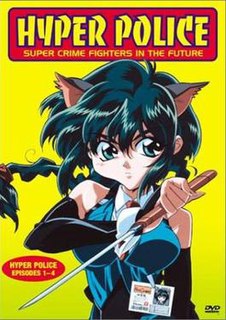 W
WHyper Police is a Japanese manga series and written and illustrated by Minoru Tachikawa. It is set in a period in the far future, in which humanity is almost extinct and most of the population are monsters. The series mostly follows the offices of a private police company and focuses on the life of Natsuki Sasahara, a young catgirl, and her co-workers: foxgirl Sakura Bokuseiinmonzeninari, werewolf Batanen Fujioka and his cousin Tomy Fujioka.
 W
WKanokon (かのこん) is a Japanese light novel series by Katsumi Nishino, with illustrations by Koin. The first novel was released by Media Factory on October 31, 2005 under its MF Bunko J imprint, and it published 15 volumes until December 24, 2010. A manga adaptation illustrated by Rin Yamaki was serialized in Media Factory's seinen manga magazine Monthly Comic Alive between the August 2006 and August 2010 issues. A drama CD was produced by Media Factory and released on March 28, 2007. A twelve-episode anime adaptation produced by Xebec aired in Japan between April and June 2008 on AT-X, and has been licensed by Media Blasters for release in North America. A two-part OVA sequel aired on AT-X in October 2009. A visual novel named Kanokon Esuii developed by 5pb. was released for the PlayStation 2 on July 31, 2008.
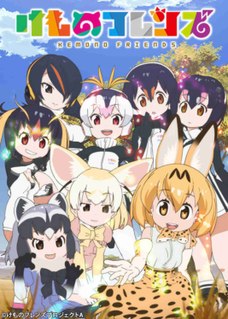 W
WKemono Friends is a Japanese media franchise created by manga artist Mine Yoshizaki. The project first produced a mobile game developed by Nexon, which ran between March 2015 and December 2016. A manga by Furai was serialized in Kadokawa's Monthly Shōnen Ace between May 2015 and March 2017. A second game in the series was released by Bushiroad on January 26, 2018. An anime television series produced by Yaoyorozu aired between January and March 2017; the anime was co-financed and licensed by Crunchyroll. A second season by Tomason aired between January to April 2019.
 W
WKumatanchi is a life simulation video game co-developed for the Nintendo DS by Vanillaware and doujin studio Ashinaga Oji-san. It was published on September 25, 2008 by Dimple Entertainment. The premise and gameplay revolves around the player taking care of an anthropomorphic girl based on the mascot character Habanero-tan, seeing her interactions with other anthropomorphic characters over two weeks in real-time. Due to its gameplay and subject matter, it was only released in Japan.
 W
WLove Pistols is a Japanese yaoi manga series written and illustrated by Tarako Kotobuki. The English release was renamed from the original Japanese title "Sex Pistols" to "avoid any legal trouble" with the English punk rock group of the same name. The premise of the story is that 30% of humans are not descended from apes but from other animals and they can interbreed with humans and with other male Zoomans by the use of a symbiote. Norio, an ordinary high school student discovers his Zoomanity and deals with the advances of many male Zoomans who want him to have their babies. The series previously licensed and published in English in North America by Tokyopop's Blu imprint is now published under Viz Media's BL imprint, SuBLime. Geneon released a series of four Drama CDs for Sex Pistols between November 27, 2004 and April 25, 2008. A two-episode original video animation adaptation went on sale in 2010.
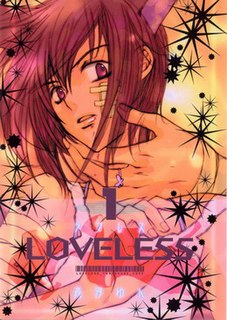 W
WLoveless is a Japanese manga series written and illustrated by Yun Kōga. It is serialized in the Japanese magazine Monthly Comic Zero Sum by Ichijinsha and collected in thirteen tankōbon as of July 2017. Kōga plans to end the manga at fifteen volumes.
 W
WMagical Meow Meow Taruto is a Japanese manga series created by Kaishaku. The series centers on the exploits of a race of pet cats, drawn as catgirls and the occasional catboy.
 W
WMoe anthropomorphism is a form of anthropomorphism in anime and manga where moe qualities are given to non-human beings, objects, concepts, or phenomena. In addition to moe features, moe anthropomorphs are also characterized by their accessories, which serve to emphasize their original forms before anthropomorphosis. The characters here, usually in a kind of cosplay, are drawn to represent an inanimate object or popular consumer product. Part of the humor of this personification comes from the personality ascribed to the character and the sheer arbitrariness of characterizing a variety of machines, objects, and even physical places as cute.
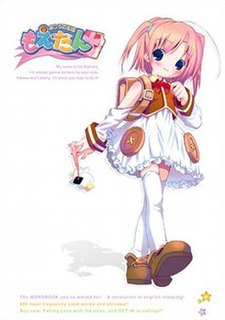 W
WMoetan (もえたん) is a series of English language study aids published by SansaiBooks in Japan. Targeted at otaku, it attempted to teach English words using examples drawn from computer games and anime.
 W
WNurse Witch Komugi is an original video animation (OVA) anime series co-produced by Tatsunoko Productions and Kyoto Animation. The series lasted for five episodes, all of which were released on DVD in North America by ADV Films. A two-episode long sequel OVA series was created, Nurse Witch Komugi-chan Magicarte Z.
 W
WOur Home's Fox Deity is a Japanese light novel series by Jin Shibamura, with illustrations by Eizō Hōden. The first novel was released in February 2004, with a total of seven volumes that have been published by ASCII Media Works under their Dengeki Bunko imprint. A manga adaptation by Suiren Matsukaze started serialization in MediaWorks' Dengeki Comic Gao! magazine in February 2007; the manga transferred to ASCII Media Works Dengeki Daioh in April 2008 after the former was discontinued in February 2008. A 24-episode anime adaptation produced by Zexcs aired in Japan between April and September 2008. NIS America licensed the anime series under the title Our Home's Fox Deity and released it in North America.
 W
WRuff Love is a one-shot Japanese manga written and illustrated by Tamaki Kirishima. The manga was serialized in Nihonbungeisha's manga magazine, Nichibun Comics. Nihonbungeisha released the manga's tankōbon volume on December 28, 2006. It is licensed in North America by Aurora Publishing, which released the manga through its yaoi imprint, Deux Press, on August 8, 2008. The manga is licensed in Taiwan by Ever Glory Publishing, which released the manga on October 5, 2007.
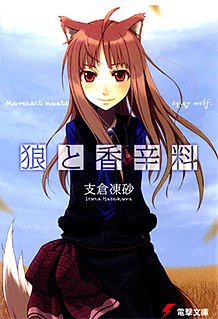 W
WSpice and Wolf is a Japanese light novel series written by Isuna Hasekura, with illustrations by Jū Ayakura. ASCII Media Works has published 22 novels since February 2006 under their Dengeki Bunko imprint. ASCII Media Works reported that as of October 2008, over 2.2 million copies of the first nine novels have been sold in Japan. The series has been called a "unique fantasy" by Mainichi Shimbun due to the plot focusing on economics, trade, and peddling rather than the typical staples of fantasy such as swords and magic. Yen Press licensed the light novels and is releasing them in English in North America. ASCII Media Works has published five volumes of a spin-off light novel series titled Wolf and Parchment since September 2016.
 W
WTsukuyomi: Moon Phase is a Japanese manga series by Keitarō Arima. The manga was serialized in the monthly manga magazine Comic Gum from March 2000 to March 27, 2008. The series spanned sixteen manga volumes that were published by Wani Books in Japan. The manga series was later adapted into a 25 episode anime television series by Shaft, and aired on TV Tokyo from October 5, 2004 to March 29, 2005. An additional OVA episode dubbed "Episode 26" was later released only on DVD on February 22, 2006. Moon Phase is about a young vampire girl named Hazuki and a Japanese freelance photographer Kouhei Morioka whom Hazuki attempts to make into her servant.
 W
WUtawarerumono is a Japanese adult tactical role-playing visual novel developed by Leaf, which released in April 2002 for Microsoft Windows. It was ported to the PlayStation 2, PlayStation Portable, PlayStation 4 and PlayStation Vita. In releases subsequent to the initial 2002 version, it is known by its more specific title Utawarerumono: Prelude to the Fallen .